Results
-
 £27.00
£27.00Edward Gregson: Birthday Prelude for Brass Band
DescriptionThis short work for brass band was written in 1982 for a concert to celebrate the 80th birthday of Harry Mortimer, one of the great figures in the world of brass bands. Not surprisingly, it references the well-known song Happy Birthday, in a breezy, up-tempo, short concert prelude.The premiere was given at the Free Trade Hall in Manchester by the Fodens Band, conducted by Howard Snell.In 2014 the composer revised it for a trip to the North American Brass Band Championships, where it was performed, also as an 80th birthday tribute, this time to the composer's brother Bram; it was subsequently dedicated to both Harry Mortimer and Bram Gregson.For more information on Edward Gregson's music please visit the composer's website: www.edwardgregson.com
Estimated dispatch 7-14 working days
-
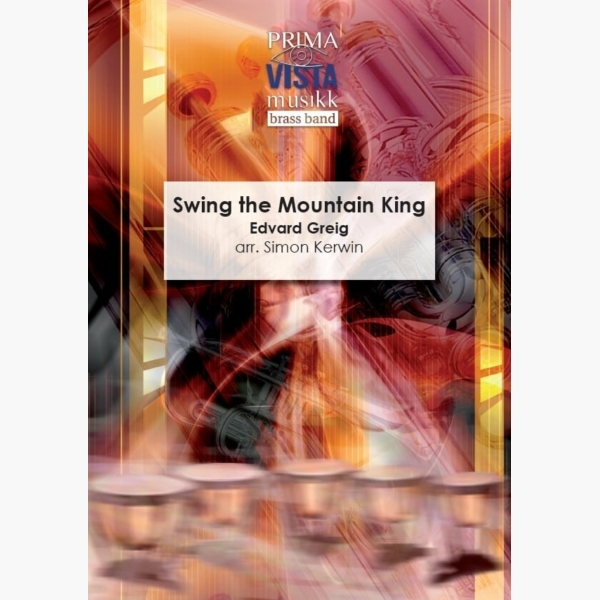 £24.95
£24.95Swing the Mountain King - Edvard Grieg - Simon Kerwin
'In the Hall of the Mountain King' was composed by Grieg as part of the incidental music for Henrik Ibsen's play Peer Gynt. A fantasy story written in verse, Peer Gynt tells of the adventures of the eponymous boy. The...
Estimated dispatch 5-7 working days
-
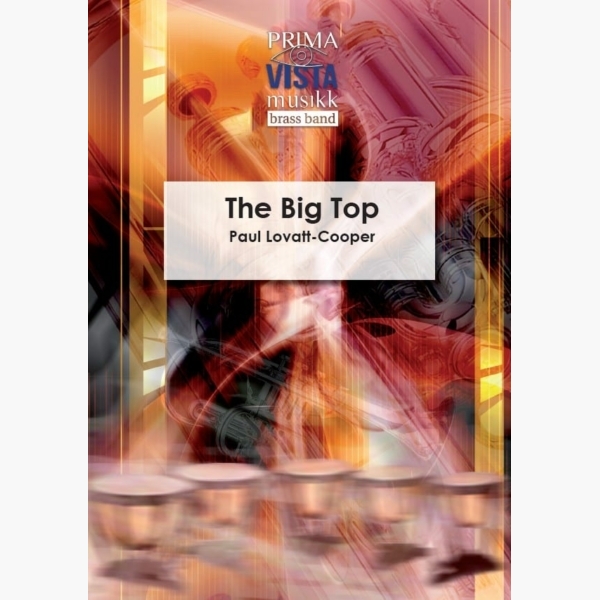 £24.95
£24.95The Big Top - Paul Lovatt-Cooper
This work was written for the Wardle High School Junior Brass Band as part of their programme at the National Festival of Music for Youth and first performed by the same band in Birmingham's Symphony Hall on 10th July 2006....
Estimated dispatch 5-7 working days
-
£29.95
WAR CRY (Brass Band Set) - Dorothy Gates
This work was written as the opener for the New York Staff Band's 125th anniversary concert in Carnegie Hall in March 2012. Based on the song, 'Ever is the war cry'. the music is quite militant in nature which is a direct reflection of the text. While the composer pays homage to the past in this fitting salute, the overall musical style is decidedly that of the 21st century.
Estimated dispatch 7-14 working days
-
£69.95
TRANSFORMATION (Brass Band Set) - Kenneth Downie
I believe in transformation, God can change the hearts of men, And refine the evil nature, till it glows with grace again'. So wrote John Gowans in the second verse of his great hymn, 'I believe that God the Father, can be seen in God the Son', written specifically to affirm Salvationists' beliefs. It is sung to the tune Bethany and in seeking to explore this great subject at the heart of the Christian gospel in musical terms, the composer has used this fine tune as the basis. Although it never appears in its entirety, it is seldom out of the picture and much of the work is derived from it. The other main source of material is the lovely, simple chorus, 'Some day I shall be like him, changed to heavenly beauty, when his face I see'. This chorus is especially prominent in the middle section but there are important references to it throughout. There are also brief references to Charles Wesley's hymn, 'Love Divine' and, in particular, the telling lines, 'Changed from glory into glory, till in Heaven we take our place'. The work suggests that, at times, the process of being transformed is a struggle, portrayed with many passages of fraught and demanding music. Considerable reserves of stamina and technique are required while, in contrast, the chorus, 'Some day I shall be like him' provides the warm, gentle centre of the work. The premiere of the work was given by The International Staff Band of The Salvation Army in Cadogan Hall on Friday 3rd June 2011, as part of the band's 120th anniversary celebrations.
Estimated dispatch 7-14 working days
-
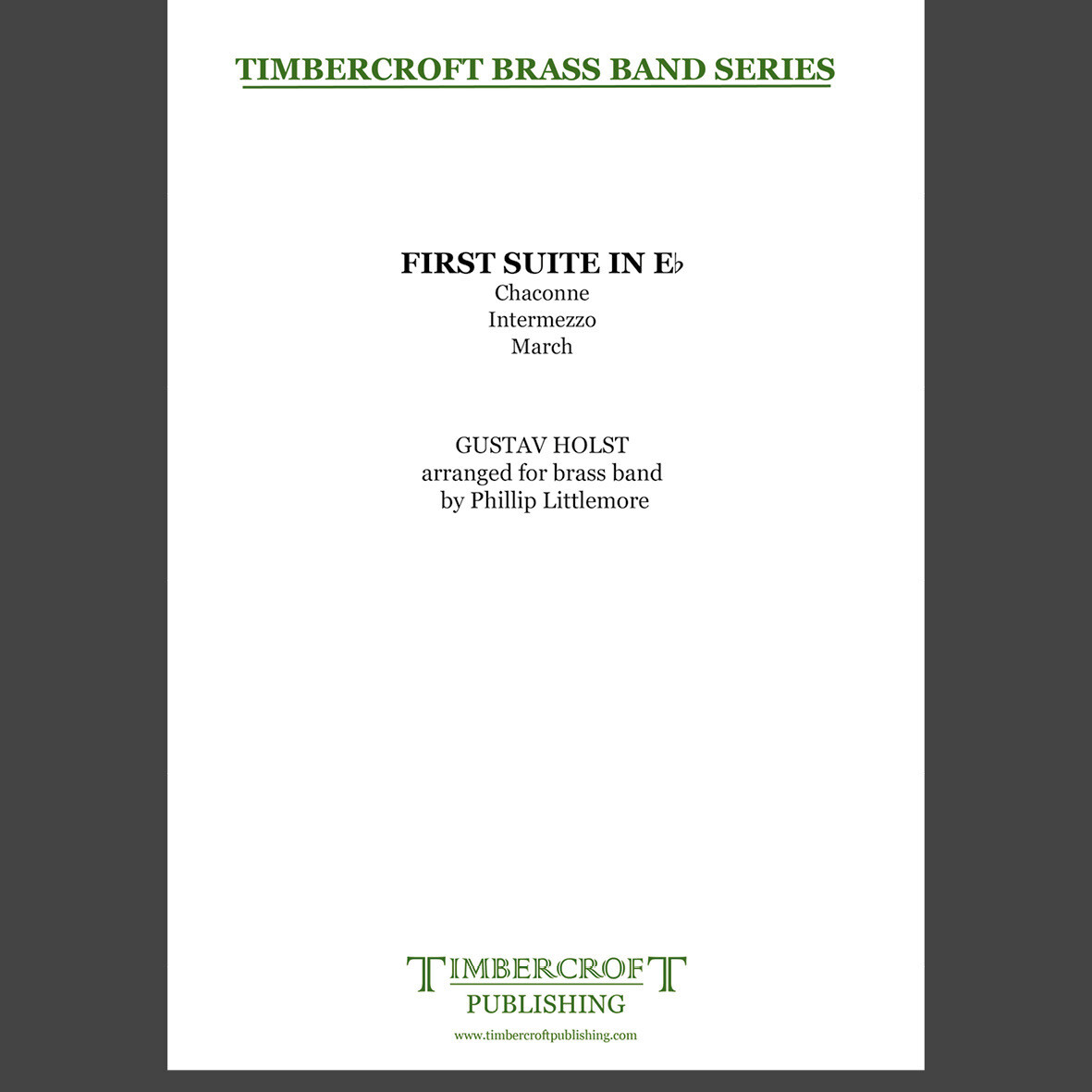 £55.00
£55.00First Suite in E flat - Gustav Holst arr. Phillip Littlemore
Although completed in 1909, Gustav Holst's First Suite in E flat received its official premiere 11 years later at the Royal Military School of Music at Kneller Hall, on 23rd June 1920. There are three movements in the suite: Chaconne, Intermezzo and March. Holst himself said "As each movement is founded on the same phrase, the suite be played right through without a break." The Chaconne begins with a ground bass, repeated throughout the ensemble sixteen times as varying instrumental textures and variations of the theme are layered within it. The Intermezzo is light and brisk and features many soloistic passages. The March consists of two themes, the opening is a light march contrasted with a longer, more lyrical second theme. The movement concludes with both themes superimposed on one an another.This brass band arrangement includes the section omitted from the first movement of the Sydney Herbert transcription. Duration: 10'Difficulty: 2nd Section and above
Estimated dispatch 5-7 working days
-
 £55.00
£55.00Second Suite in F - Gustav Holst arr. Phillip Littlemore
Gustav Holst's Second Suite in F was composed in 1911, two years after the first suite, yet like his first suite it didn't receive its premiere until many years later, on 30th June 1922, at Royal Albert Hall in London and performed by band of The Military School of Music.The Suite uses English folk songs and folk dance tunes throughout. The opening march movement uses three tunes: a lively Morris Dance called Glorishears, the folk song Swansea Town and finally Cloudy Banks. The first two tunes are repeated to conclude the first movement. The second movement is a setting of I'll Love My Love, a sad story of a young maiden driven into Bedlam by grief over her lover being sent to sea by his parents to prevent their marriage. The Song of the Blacksmith follows with a lively hammer rhythms and the score actually asks for a blacksmith's anvil. The final movement is a fantasia based on the 16th Century English country-dance, The Dargason, with the Elizabethan love-song Greensleeves intertwined. This is a new brass band arrangement that has a lighter texture to that made by Sydney Herbert, restoring it to the original key of F and including sectioned omitted from the 1923 arrangement.Duration: c. 12 minutesDifficulty: 2nd Section and above
Estimated dispatch 5-7 working days
-
 £38.95
£38.95Unity Series Band Journal - Numbers 530 - 533, June 2024
530: Carol Arrangement - God rest you merry, gentlemen (Noel Jones)This swing arrangement of the traditional English carol also features references to O come, all ye faithful (C.C. 61) and Jingle Bells (C.C. 121). Play with imagination and a sense of style!531: Go, tell it on the mountain! (Nathanael Watchorn)Historically, the passion of enslaved people in America for singing about the Gospel of Jesus is well documented, but it was men of three generations, each named John Wesley Work, who enabled spirituals to become more widely known. John Wesley Work Sr, a church choir director in Nashville, Tennessee, wrote and arranged music for the pioneering Fisk Jubilee Singers whose early repertoire consisted largely of spirituals. This passion and knowledge of spirituals was passed down through the generations. John Work III travelled hundreds of miles to collect songs by attending church services in remote areas. In 1940, he published a collection of 230 songs which included a setting of Go, tell it on the mountain! that is still performed today.Nathanael Watchorn, a Bandsman at Regent Hall Corps in London, is a new contributor to the journals. He originally wrote this as a vocal arrangement for the group FourHymn, subsequently transcribing it for the corps' Young People's Band, while he was Band Leader.532: Carol Arrangement - They all were looking for a king (Stephen Hull)At the North American Composers Forum, Major Len Ballantine challenged participants to find an unfamiliar song in the Salvation Army Song Book and try to write an arrangement of the listed tune. Stephen Hull happened across They all were looking for a king (S.A.S.B. 128) and the tune Childhood (T.B. 421) which lead to this arrangement.533: March - Washed and healed (Eiliv Herikstad)The Christian experience of many people will have been positively impacted by the life of the late Bandmaster Eiliv Herikstad, either personally or through his musical leadership and compositions. This march is the second publication from this well-known Salvation Army composer since his Promotion to Glory last year. This march is more traditional in style that many of his compositions but contains a strong Christian message and demonstrates his compositional expertise.
Estimated dispatch 7-14 working days
-
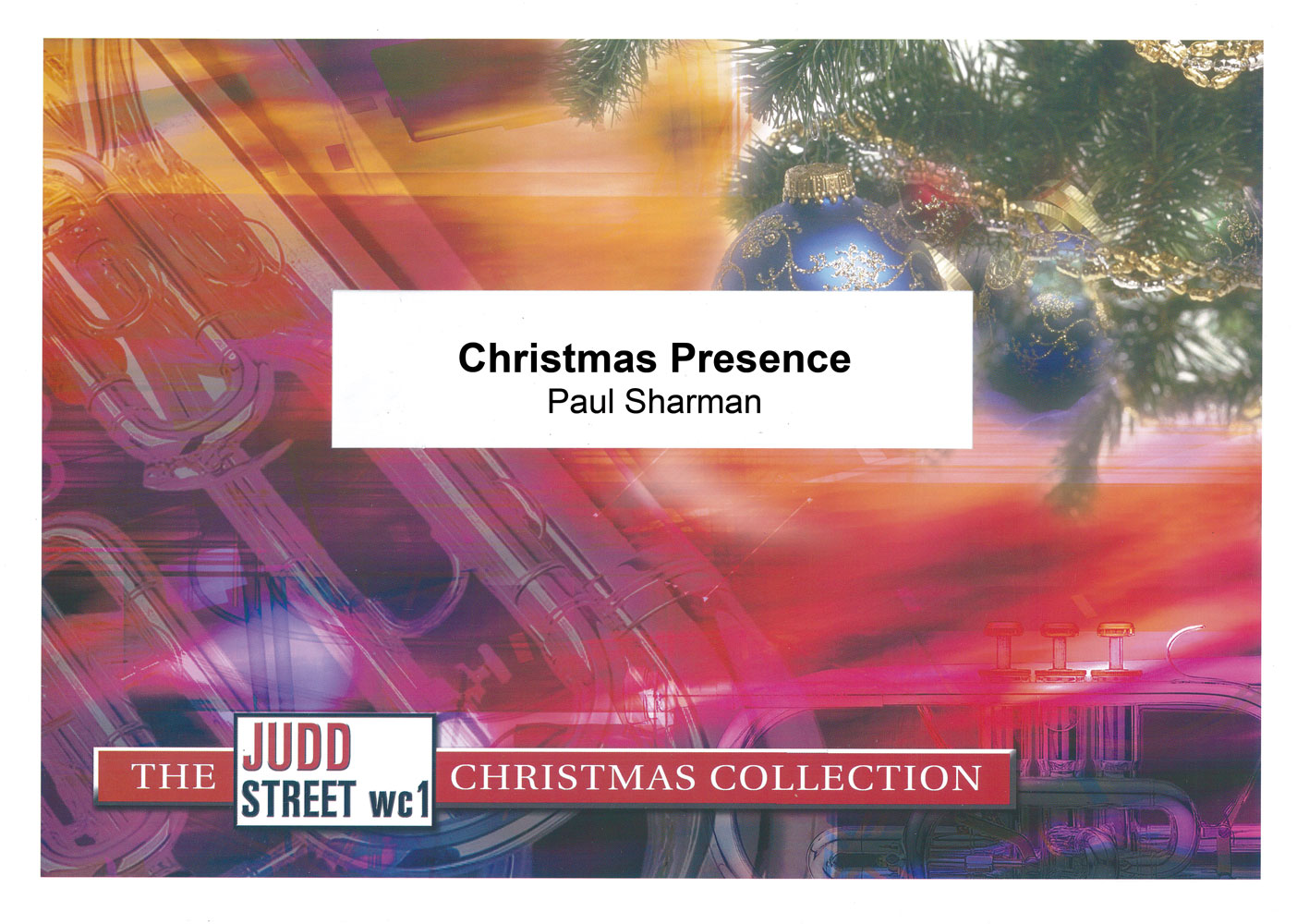 £29.95
£29.95Judd: Christmas Presence
Written for Birmingham Citadel Band to play at their annual carol concert at Symphony Hall, Birmingham, this piece tells the story of the Nativity using the carols 'Who is he?' and 'Calypso Carol' (Christmas Collection 16). Brief appearances are made by the shepherds ('While shepherds watched'), the angels ('Ding dong! merrily on high') and the wise men ('Three kings' march' and 'We three kings of Orient are'). The music finishes with a majestic setting of the chorus of 'Who is he?', reminding us who the baby Jesus is:'Tis the Lord! O wondrous story,'Tis the Lord, the king of Glory!At his feet we humbly fall,Crown him, crown him Lord of all!
Estimated dispatch 7-14 working days
-
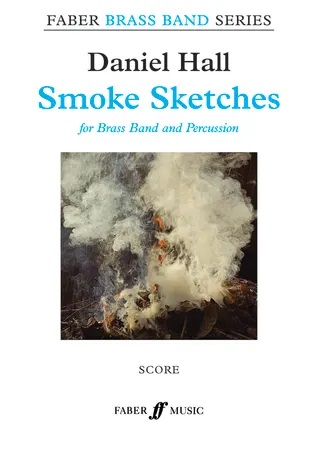 £65.00
£65.00Smoke Sketches (Brass Band - Score and Parts)
Smoke Sketches is Daniel Hall's first original work to be published in the Faber Music Brass Band Series. Daniel is one of the most gifted of the rising generation of composers writing for brass bands. Smoke Sketches was composed at the invitation of Brass Bands England for the Intermediate Section of the 2017 National Youth Brass Band Championships of Great Britain.This colourful, jazzy suite draws inspiration from the ancient art of gazing into smoke from fire to find stories through the act of divination. Into the Blaze suggests someone briskly fire-walking, barefoot, with unexpected sparks fizzling from the ground. A Lonesome Ember captures the fleeting life of a small ember, beginning insignificantly and gradually evolving into a larger being before disappearing into ash, while Spark of Light bristles with life and energy.Band Grade 3/4, duration 8 minutes.
Estimated dispatch 7-14 working days
